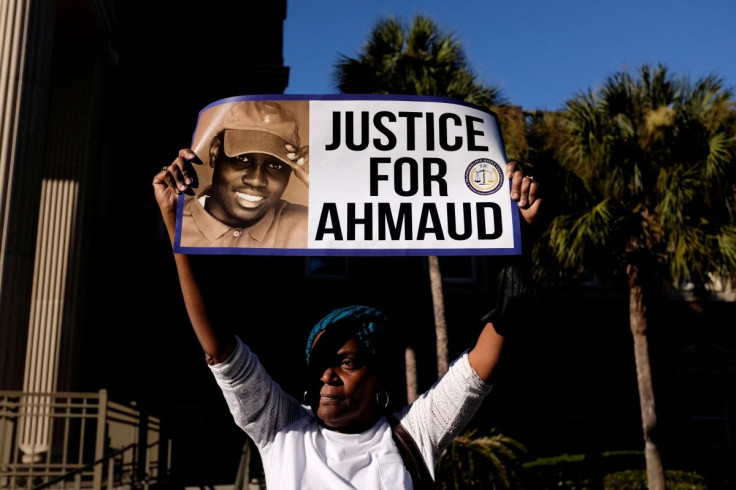Prosecutors Focus On Arbery Killers' Racist Online History As Hate-crimes Trial Begins

A federal prosecutor in Georgia said on Monday that three white men facing a hate-crimes trial for murdering Ahmaud Arbery, a 25-year-old Black man, had a long history of using racial epithets and undoubtedly killed him because of his race.
Arbery did nothing to deserve his fate, Barbara Bernstein, deputy chief of the Department of Justice's civil rights division, told the U.S. District Court in the coastal town of Brunswick in her opening statement.
Gregory McMichael, 66, his son Travis McMichael, 36, and neighbor William "Roddie" Bryan, 52, were convicted last year of shooting dead Arbery after chasing him in pickup trucks through their mostly white neighborhood because they wrongly suspected he may have been guilty of a crime.
Unlike last year's state trial, the federal hate-crimes trial will focus more squarely on the motive for the killing and whether the defendants targeted Arbery because he was Black, as the prosecution alleges.
Arbery's killing was one of several murders of Black men and women, often at the hands of police, that helped spark recent global racial justice protests. The federal trial of Arbery's killers is one of the first in which those who carried out a high-profile killing are facing a jury in a hate-crime trial. Bernstein said if Arbery, an avid runner, had been white, he would have been able to go for an afternoon jog unmolested and "been home in time for Sunday supper."
Bernstein cited several messages made on Facebook and elsewhere in which all three men used racial epithets.
She especially highlighted the words of Travis McMichael - who shot Arbery - who she said had made violent and racist statements on social media. He had also told a friend that he was glad to have left the Coast Guard because he no longer had to work with or be around Black people, she added.
Defense attorneys for the three men said in their opening statements that they found their clients' use of racial epithets deeply offensive, but stressed it was no reason to convict them. They said the men were not motivated by Arbery's race.
"I can't stand before you and say my client has never used the 'N-word'," said Amy Copeland, the attorney for Travis McMichael. "He did. He left a digital footprint over several years."
But Copeland said Travis McMichael had chiefly been concerned with cases of theft that had left his neighborhood on high alert when he decided to chase down Arbery.
Trial experts told Reuters that the challenge for the prosecutors will be to back up the evidence of racist utterances with evidence that on the day of the shooting the three men were motivated by racial animus.
The court is scheduled to hear from Special Agent Richard Dial of the Georgia Bureau of Investigation, who has previously testified that Bryan told his office that Travis McMichael uttered a racial slur as Arbery lay dying.
BIAS OR PROTECTION?
The McMichael's and Bryan were convicted of murder in a state trial last year and sentenced to life in prison for the February 2020 shotgun slaying of Arbery, 25.
The federal jury will decide whether racial bias drove the defendants' actions as they chased down Arbery, an issue not examined in the first trial.
The men told the state court they were trying to make a citizen's arrest when they pursued Arbery in trucks through the streets of their neighborhood. Federal prosecutors said they will prove that they chased Arbery because of his race, a hate crime that carries a life sentence.
Prosecutors need to "get into the mindset" of the accused men and show that racial bias drove them, said Ziv Cohen, a trial expert and a professor of forensic psychiatry at Cornell University.
The defense will likely need to show that the men were motivated only to protect their neighborhood, Cohen said.
In their state trial the men claimed they had chased Arbery, a jogging enthusiast, because they thought he was running away after committing a crime, although they had no evidence that he had. Prosecutors in that trial said the men had unfairly jumped to conclusions based on the color of Arbery's skin.
Travis McMichael said at a hearing last month that he was willing to plead guilty to attacking Arbery because of his "race and color" after reaching a plea agreement with prosecutors.
But he changed his mind after Judge Lisa Wood rejected the agreement, saying she could not accept it because it bound her to sentencing McMichael to 30 years in federal prison before he was handed back to the state of Georgia to serve out the rest of his life sentence for murder.
She said she needed more information to know whether a 30-year sentence was just, and cited emotional testimony from Arbery's family.
© Copyright Thomson Reuters 2024. All rights reserved.







